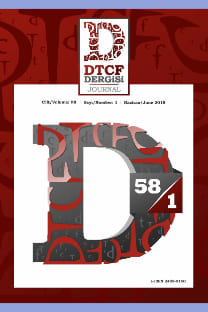TURNING LANGUAGE INSIDE OUT IN BECKETT'S NOT I
BECKETT'İN NOT I OYUNUNDA DİLİN TERSYÜZ EDİLMESİ
___
Barreca, Regina. “Metaphor-into-Narrative: Being Very Careful with Words.” Women’s Studies 15.1-3 (1988): 243–256.Barthes, Roland. “The Grain of the Voice.” Image-Music-Text. New York: Hill and Wang, 1978. 179-189.
Beckett, Samuel. “Not I (1972).” The Complete Dramatic Works. Kent: Faber and Faber, 2006. 376-383.
Beckett, Samuel. Disjecta: Miscellaneous Writings and a Dramatic Fragment (1983). Ed. Ruby Cohn. New York: Grove, 1984.
Boulter, Jonathan. Beckett: A Guide for the Perplexed. New York: Continuum, 2008.
Brater, Enoch. Beyond Minimalism: Beckett's Late Style in the Theater. New York: Oxford UP, 1987.
Catanzaro, Mary. “Recontextualizing the Self: The Voice as Subject in Beckett’s “Not I”.” South Central Review 7.1 (1990): 36-49.
Deleuze, Gilles, and Félix Guattari. A Thousand Plateaus: Capitalism and Schizophrenia (1980). Trans. Brian Massumi. Minneapolis: U of Minnesota P, 1987.
Derrida, Jacques. Of Grammatology (1974). Trans. Gayatri Chakravorty Spivak. Baltimore: The Johns Hopkins UP, 1976.
Derrida, Jacques. Positions. Trans. Alan Bass. Chicago: U of Chicago P, 1982.
Derrida, Jacques. “Structure, Sign and Play in the Discourse of the Human Sources.” Writing and Difference. Trans. Alan Bass. Chicago: U of Chicago P, 1978. 278-293.
Derrida, Jacques. “For the Love of Lacan.” Resistances of Psychoanalysis. Trans. Peggy Kamuf, Pascale-Anne Brault, and Michael Naas. Palo Alto: Stanford UP, 1998. 39-69.
Freud, Sigmund. “Female Sexuality.” The Standard Edition of the Complete Psychological Works of Sigmund Freud. 21 (1927-1931). Trans. James Strachey. London: Hogarth, 1961. 223-243.
Gillette, Kyle. “Zen and the Art of Self-Negation in Samuel Beckett’s Not I.” Comparative Drama 46.3 (2012): 283-302.
Herzogenrath, Bernd. An American Body-politic: A Deleuzian Approach. New Hampshire: Dartmouth College P, 2010.
Lacan, Jacques. Écrits (1971). Trans. Alan Sheridan. London: Routledge, 2005.
Lacan, Jacques. Seminar, Book II. Trans. Sylvana Tomeselli. New York: W.W. Norton, 1978.
Lacan, Jacques. Seminar, Book III. Trans. Russell Grigg. London: Taylor and Francis, 2008.
Lacan, Jacques. Seminar, Book IV. Ed. Jacques-Alain Miller. London: Tavistock/Routledge, 1988.
Lacan, Jacques. Seminar, Book V. Trans. Russell Grigg. Malden: Polity, 2017.
Lacan, Jacques. Seminar, Book XVIII: On a Discourse that might not be a Semblance. Trans. Cormac Gallagher. Unpublished translation, 1971. Web. 20 August 2018.
Lacan, Jacques. Seminar, Book XX: Encore. Trans. Cormac Gallagher. Unpublished translation, 1972-73. Web. 20 August 2018.
Lacan, Jacques. “Seminar XXII of 21 January 1975.” Feminine Sexuality: Jacques Lacan and the Ecole freudiene. Ed. Juliette Mitchell and Jacqueline Rose. Trans. Jacqueline Rose. New York: Norton, 1982. 162-172.
Salisbury, Laura. “Art of Noise: Beckett’s Language in a Culture of Information.” Samuel Beckett Today/Aujourd’hui 22 (2010): 355-371.
Sarup, Madan. Jacques Lacan. Hertfordshire: Harvester Wheatsheaf, 1992.
Saussure, Ferdinand de. Course in General Linguistics. Ed. Charles Bally and Albert Sechehaye, Trans. Wade Baskin. New York: Philosophical Library, 1959.
Weldon, Fay. The Life and Loves of a She-Devil. New York: Pantheon Books, 1984.
Yuan, Yuan. “From Ideology of Loss to Aesthetics of Absence: The Endgame in Beckett’s.” The Lost Ones. Beckett, Joyce and the Art of the Negative. Ed. Colleen Jaurretche. New York: Rodopi, 2005. 235-246.
- ISSN: 0378-2905
- Yayın Aralığı: 2
- Başlangıç: 1942
- Yayıncı: Ankara Üniversitesi Dil ve Tarih-Coğrafya Fakültesi
RUS DİLİNDE ZAMAN ANLAMLARININ OLUŞUMUNDA GÖRÜNÜŞ KATEGORİSİNİN ETKİSİ
JAMES J. GIBSON'IN GÖRSEL ALGI KURAMININ BEDENLENMİŞ BİLİŞ KAVRAMI BAĞLAMINDA BİR TARTIŞMASI
İSTANBUL ÖĞRETMENLERİNİN BURSA SEYAHATİ VE MUSTAFA KEMAL PAŞA'NIN BAŞÖĞRETMENLİĞE GEÇİŞ KONUŞMASI
BİR DİS/ÜTOPYA OLARAK POZİTİVİZM KARŞISINDA FARKLI BİLİMSEL YAKLAŞIMLAR
KARAİN MAĞARASI TAYACIAN ALET ENDÜSTRİSİ TEKNO-TİPOLOJİSİ
SEYFETTİN ÖZEGE VE KİTABİYAT FELSEFESİ
TÜRKİYE'DE BİLGİ YOĞUN İŞ HİZMETLERİNİN (BYİH) BÖLGESEL UZMANLAŞMA ÖRÜNTÜSÜ
M Tahsin ŞAHİN, MUTLU YILMAZ, ÇİĞDEM VAROL ÖZDEN
KAYNAK BELLEĞİ: DERLEME ÇALIŞMASI
